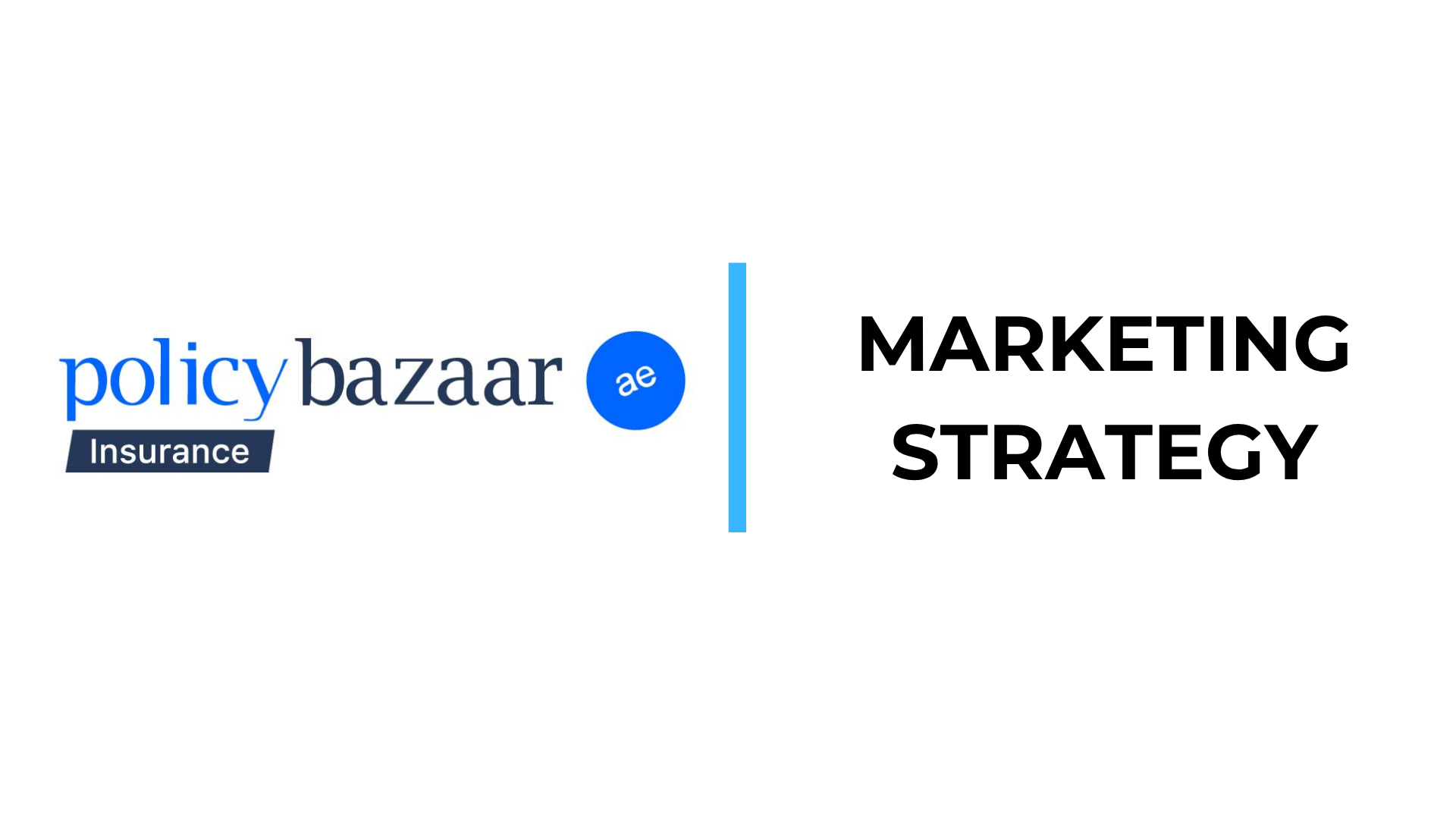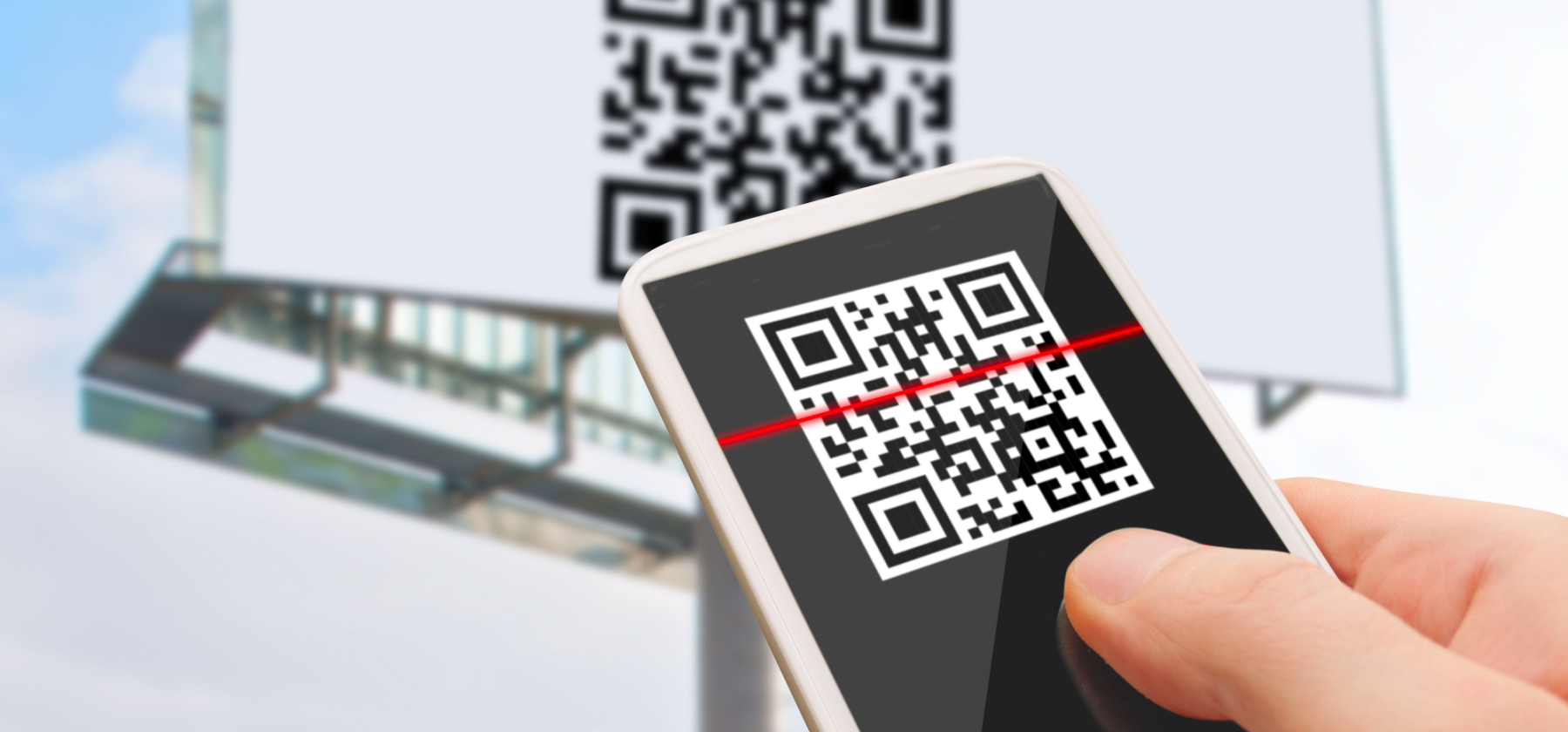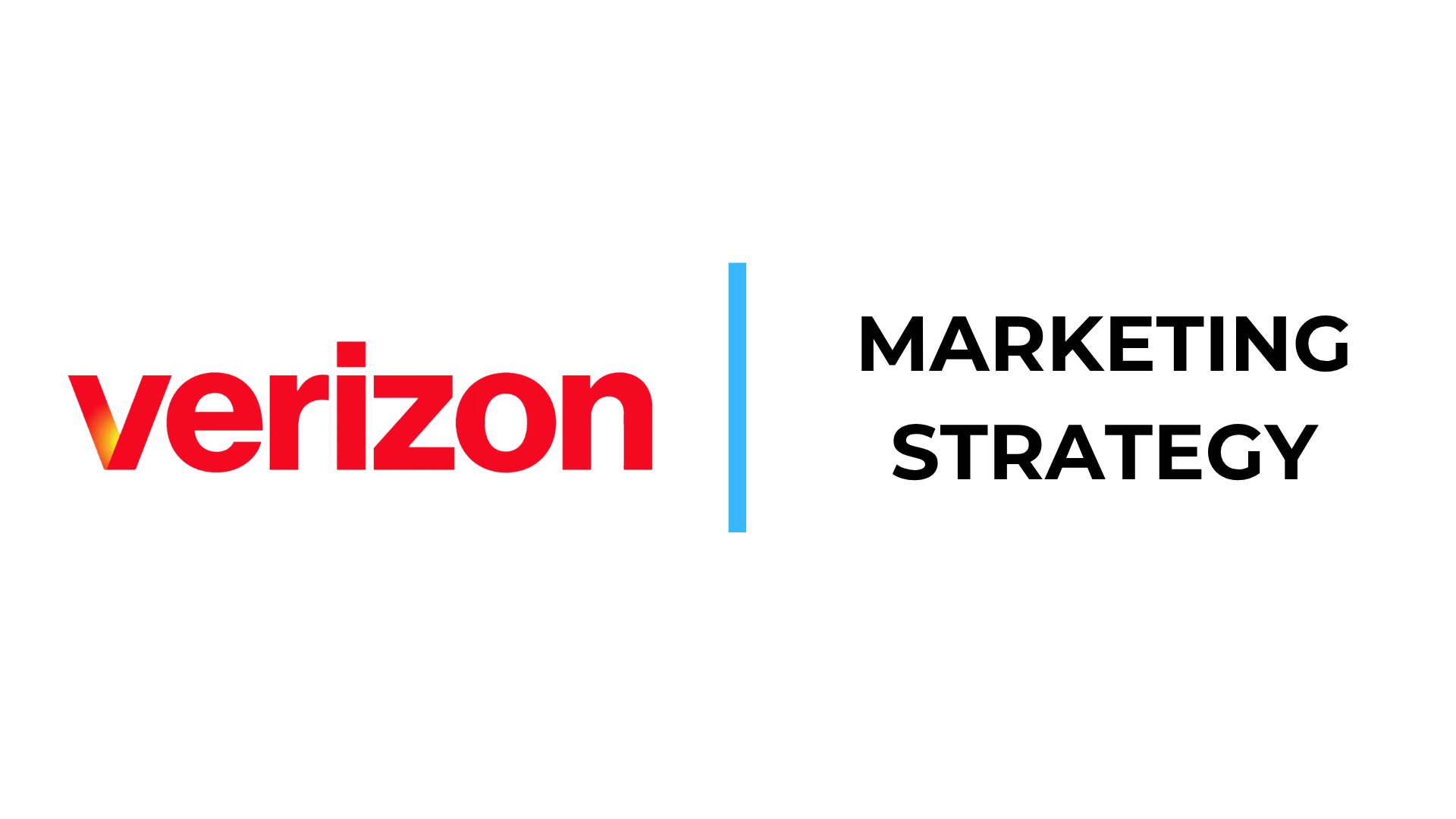Verizon Marketing Strategy (2025)
The Verizon Marketing Strategy centers on delivering reliable, high-speed connectivity while personalizing customer experiences. As one of the United States’ top telecommunications providers, Verizon has evolved from traditional phone services to a full-spectrum digital powerhouse—offering wireless, broadband, IoT, and 5G solutions. Its strategic evolution reflects a shift from competing on network strength alone to excelling in customer-centric value propositions.
What sets Verizon apart is its unwavering investment in network infrastructure—consistently topping independent performance rankings—and its innovative services tailored to diverse users. From rural families streaming movies on Fios to urban businesses deploying private 5G networks, Verizon redefines customer engagement by aligning advanced technologies with real-world needs.
In an era where seamless digital connectivity underpins work, entertainment, and daily life, Verizon’s marketing taps into universal human behaviors: the need to connect, explore, and transact without friction. Whether through campaign storytelling that emphasizes trust and speed or through strategic partnerships with content providers and smart-device platforms, Verizon bridges the gap between human experience and technological innovation.
Today, Verizon stands at a crossroads of consumer trends—remote work, smart homes, telehealth, and immersive media—all powered by resilient connectivity. This article explores how Verizon’s integrated marketing approach makes it a model for brands aiming to marry technological advancement with emotional resonance.
Verizon Goals and Objectives
Verizon’s marketing objectives are tightly aligned with its mission to build the most reliable and secure networks while shaping the future of digital communication. The company’s strategic priorities emphasize expanding its technological footprint, enhancing customer experiences, and sustaining long-term growth across consumer and enterprise markets.
Strengthen 5G Leadership
Verizon aims to lead the 5G space by accelerating nationwide coverage and expanding use cases in business and consumer sectors—a move that places it among the world’s most innovative business models. For instance, offering low-latency 5G for mobile gaming or real-time logistics in smart warehouses helps showcase the network’s power.
Expand Fiber and Home Internet Reach
By investing in Fios and 5G Home Internet, Verizon seeks to offer broadband alternatives in underserved areas. A suburban household gaining access to 5G Home for the first time illustrates this mission in action.
Deepen Customer Engagement through Personalization
Through tools like the My Verizon app and loyalty programs (e.g., Verizon Up), the company customizes experiences and rewards—an approach reminiscent of the freemium business model that blends free access with premium upgrades to drive loyalty.
Monetize Premium Network Services
Verizon leverages its network reliability to upsell services like mobile edge computing, private 5G, or enterprise cybersecurity. A retail chain upgrading to Verizon Business for cloud-based POS systems demonstrates this strategy.
Drive Growth via Strategic Partnerships
Collaborations with Disney+, Apple, or NFL+ allow Verizon to bundle premium content and drive both new subscriptions and brand affinity.
Promote Sustainability and ESG Initiatives
From green energy goals to digital inclusion, Verizon’s marketing highlights how the brand supports broader societal values, attracting socially conscious consumers.
These objectives empower Verizon to differentiate in a highly commoditized market, focusing on customer value, innovation, and trust.
Who is Verizon’s Target Audience?
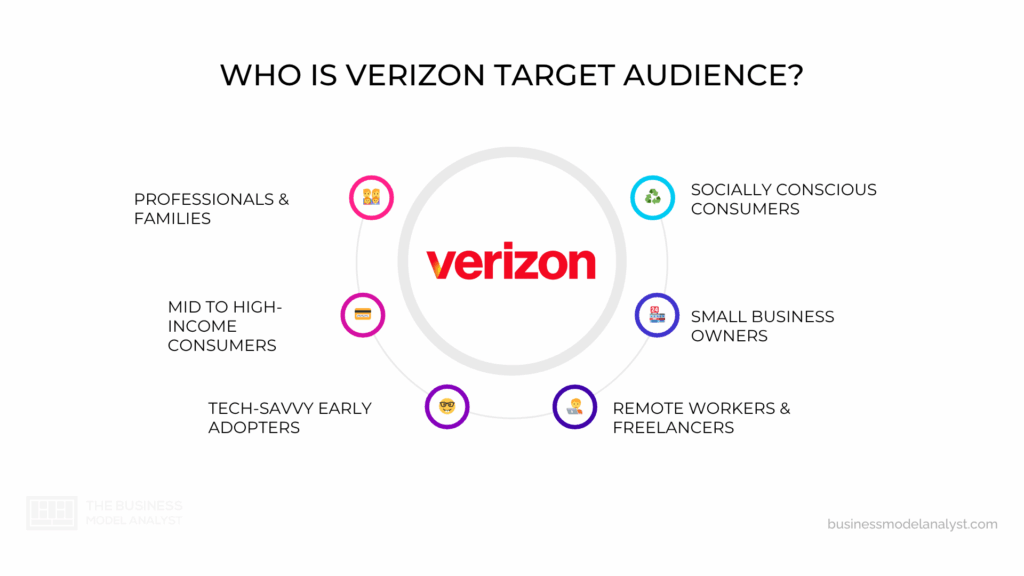

Verizon targets a broad yet segmented audience base, ranging from individual consumers to large-scale enterprises. By understanding nuanced customer needs, the company tailors its marketing, services, and offerings to maximize relevance and satisfaction—a capability central to any successful subscription business model.
Verizon Demographics
Verizon’s consumer audience spans from tech-savvy Gen Z to Baby Boomers prioritizing reliability. Key age groups include 25–54, typically employed professionals or heads of households. Income levels skew mid to high, especially for premium wireless and Fios plans. Gender-neutral in appeal, Verizon markets equally to men and women.
Verizon Psychographics
Customers value quality, security, and innovation. Many are family-focused, seeking dependable home internet or mobile plans. Others are professionals and entrepreneurs who need uninterrupted connectivity for remote work or travel. Verizon also appeals to early adopters—those intrigued by cutting-edge 5G or smart home integrations.
Verizon Geography
Operating across the U.S., Verizon adapts its offerings by location. Urban markets receive ultrafast 5G Ultra Wideband, while suburban and rural communities benefit from expanding 5G Home Internet. Region-specific promotions (e.g., fiber rollouts in the Northeast) reflect local infrastructure and demand.
Verizon Behavior
Behaviorally, Verizon customers tend to be loyal and data-intensive. Many prioritize seamless streaming, smart device control, or mobile gaming. They interact via online platforms like the My Verizon app, regularly upgrade devices, and engage with rewards programs. Business clients value managed services and custom connectivity solutions.
To meet these diverse needs, Verizon uses modular plans, bundling (like Disney+ with wireless), and omnichannel support. A young couple might pick a 5G unlimited plan with streaming perks, while a freelancer chooses mobile hotspots and cloud backups. By decoding user intent and lifestyle, Verizon delivers targeted value across segments.
Marketing Mix of Verizon
Verizon Product
Verizon offers a wide array of services, from mobile phone plans and 5G connectivity to home internet and business solutions—operating as a sophisticated multisided platform business model that connects consumers, enterprises, and content providers. Its core offerings include wireless plans (prepaid, postpaid), Fios fiber-optic internet, and 5G Home Internet.
The company also provides enterprise-grade solutions like mobile edge computing and IoT platforms. By bundling products—such as unlimited data with streaming services—Verizon builds value and stickiness in the customer relationship.
Verizon Price
Verizon employs a premium pricing strategy, reflecting its network quality and brand trust. Mobile plans are tiered—starting from basic talk/text/data to premium unlimited packages bundled with perks (Disney+, Apple Music). The company also uses value-based pricing, offering trade-in credits, family plan discounts, or loyalty rewards. For businesses, Verizon offers scalable pricing for cloud services or private networks, matching complexity and bandwidth needs.
Verizon Place
Verizon uses a hybrid distribution model. Physical retail stores across the U.S. provide in-person support and device purchases. Online, customers can order plans, devices, or technical support through the Verizon website or mobile app. For business clients, Verizon has dedicated B2B sales teams and partner ecosystems. Whether it’s a kiosk in a mall or a corporate service desk, Verizon ensures brand accessibility and service consistency.
Verizon Promotion
Promotional efforts center on performance, reliability, and innovation. High-profile ads highlight 5G speed or emergency services powered by Verizon. Sponsorships with the NFL or concerts promote cultural relevance. Digital marketing includes app-based upgrades, social media content, and influencer reviews of devices. Seasonal promotions and device deals, like “Buy one, get one free,” also drive conversions.
This mix ensures Verizon appeals across lifestyles—from busy families streaming on multiple devices to businesses demanding resilient digital infrastructure.
What are Verizon’s Strategies?
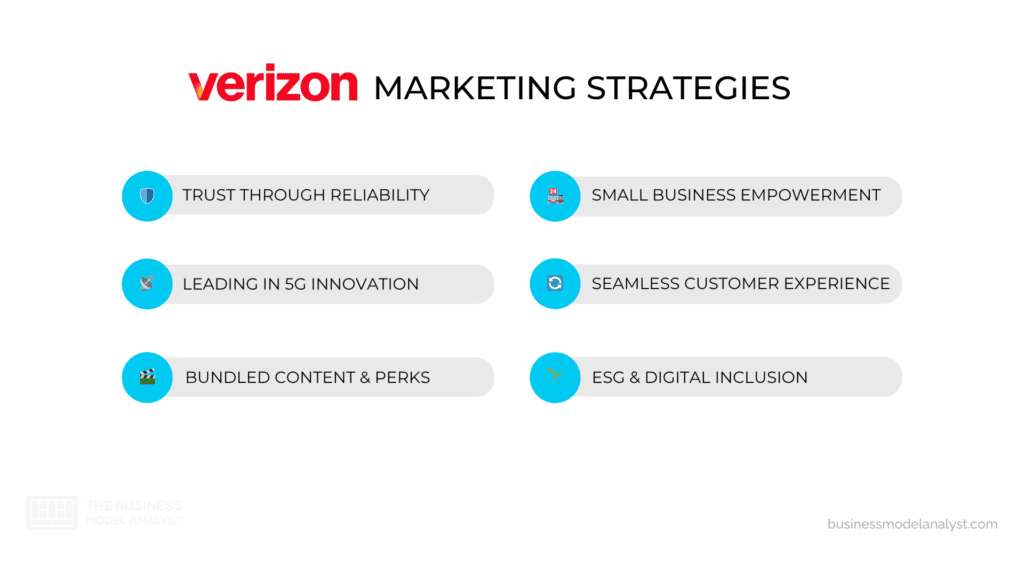

Building Emotional Trust Through Reliability
Verizon positions itself as the most dependable network. Campaigns emphasize emotional stakes—like a parent reaching their child or first responders relying on coverage—reinforcing trust. Ads like “Built Right” communicate peace of mind, making reliability a cornerstone of brand loyalty.
Leading 5G Innovation
Verizon invests heavily in 5G Ultra Wideband and uses marketing to spotlight its benefits: immersive AR experiences, real-time gaming, and smart city infrastructure. Business solutions like private 5G for manufacturing illustrate its push beyond consumer use, cementing Verizon as a tech innovator.
Expanding Content Ecosystems
Through partnerships with Disney+, Apple Music, and Netflix, Verizon enriches wireless plans with premium entertainment. This strategy transforms utility into lifestyle, attracting value-seekers who want bundled perks alongside connectivity.
Empowering Small Businesses
Verizon’s “Small Business Days” and Verizon Business platforms offer scalable plans, tech consultations, and cloud tools. By addressing local entrepreneurs’ needs, the brand reinforces its commitment to community-driven growth.
Prioritizing Customer Experience
The My Verizon app exemplifies convenience: from billing to data usage, customers manage everything digitally. AI chat support, personalized offers, and device trade-in programs make Verizon’s service feel seamless and intuitive.
Promoting ESG and Digital Inclusion
Campaigns like “Citizen Verizon” highlight efforts in sustainability, STEM education, and internet access for underserved communities. These initiatives position the brand as socially conscious, aligning with values-driven consumers.
Each strategy enhances Verizon’s image not only as a service provider but as a trusted digital partner in modern life.
Verizon Channels
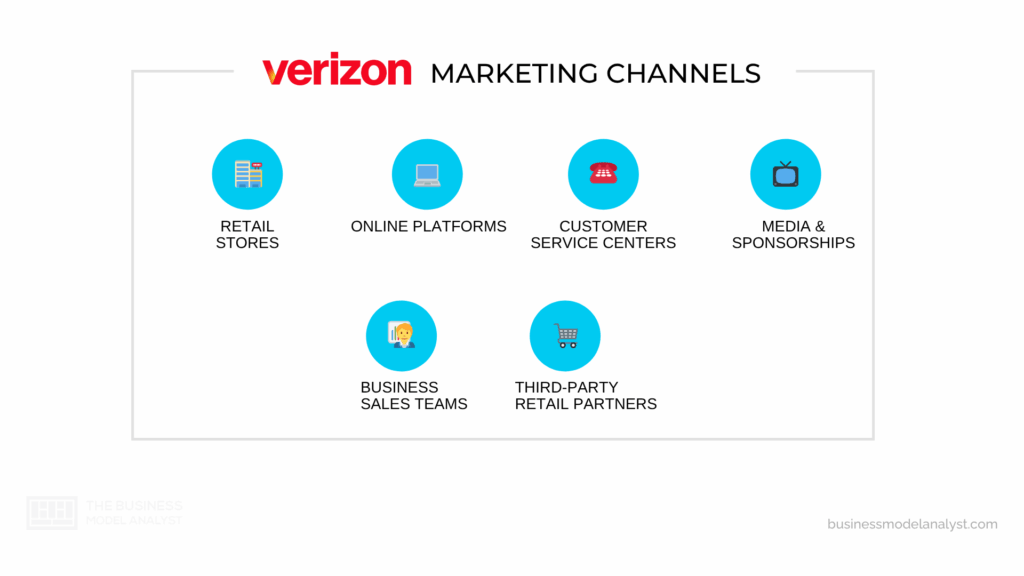

Verizon engages its audience through a carefully structured mix of digital, physical, and strategic partnership channels. Each plays a distinct role in expanding reach, enhancing customer experience, and driving revenue.
Retail Stores
Verizon operates hundreds of branded stores across the U.S., providing face-to-face customer service, device demos, and hands-on tech consultations. These outlets serve as key locations for new phone activations, trade-ins, and issue resolution—helping build customer trust through human interaction.
Online Platforms
The My Verizon app and Verizon.com allow users to manage plans, upgrade devices, or troubleshoot issues. E-commerce also plays a major role—especially during product launches—enabling fast, seamless purchases without visiting a store.
Customer Service and Call Centers
Verizon’s dedicated service centers handle millions of inquiries annually. These are critical for resolving technical issues and supporting enterprise clients. AI-powered chatbots and self-service portals help offload simpler requests.
Media and Sponsorships
Television, digital ads, and sponsorships with the NFL, gaming leagues, or music events amplify brand visibility. For instance, Verizon’s 5G presence in stadiums is both a tech demo and a marketing channel.
Business Sales Teams
For corporate clients, Verizon employs account managers and field reps to offer customized connectivity, cybersecurity, and IoT solutions. These relationships are cultivated through webinars, consultations, and co-branded activations.
Third-Party Retail and Carrier Partners
Verizon partners with retailers like Best Buy and Walmart to extend its reach beyond its own stores. It also collaborates with manufacturers (e.g., Apple, Samsung) for device promotions bundled with Verizon plans.
Each channel enhances Verizon’s omnipresence—ensuring accessibility whether customers are walking into a store, logging into an app, or watching the Super Bowl.
How to Apply Verizon Strategies to Your Business
Build Trust Through Performance: Verizon’s brand centers on reliability. Small businesses can adopt this by consistently delivering what they promise—whether it’s on-time delivery, product quality, or responsive support. Use testimonials or behind-the-scenes content to show your reliability. Tools like Trustpilot or Google Reviews can reinforce customer confidence.
Bundle Value into Every Offer: Just as Verizon includes streaming services with wireless plans, businesses can increase perceived value through thoughtful bundling. A boutique might add free gift wrapping; a SaaS firm could offer onboarding webinars. Bundles not only upsell but deepen loyalty by solving more of the customer’s problems.
Leverage Digital for Seamless Experiences: Verizon’s app empowers users to manage services effortlessly. Similarly, businesses can streamline digital touchpoints—enable online booking, mobile billing, or self-service FAQs. Tools like Stripe, Calendly, and Zendesk can simplify interactions, making it easier for customers to choose and stay.
Empower Local Communities: Through its small business outreach and digital inclusion efforts, Verizon aligns with local values. You can do this by supporting neighborhood events, mentoring students, or sourcing from local suppliers. Community investment increases brand authenticity and builds word-of-mouth goodwill.
Innovate Beyond the Core Product: Verizon uses its network to launch cutting-edge services (e.g., private 5G, IoT). Any business can ask: What adjacent services can I offer? A bakery might launch baking classes online. A fitness coach could sell branded gear. Innovation that complements your core builds long-term relevance.
Use Data to Personalize Offers: Verizon customizes experiences through the My Verizon app and loyalty programs. Even small businesses can apply this by segmenting email lists, recommending products based on past purchases, or using analytics to refine offerings. Platforms like Mailchimp or Klaviyo make personalization accessible.
Champion a Bigger Cause: Customers reward businesses that take a stand. Whether it’s environmental sustainability or social justice, link your operations to meaningful initiatives. Like Verizon’s Citizen Verizon program, be transparent about your goals and progress.
By applying these strategies, businesses can transform from simple service providers to trusted, innovative brands with staying power.
Conclusion
Verizon’s strategic marketing approach showcases how a technology-driven brand can lead through trust, innovation, and adaptability. By aligning premium service with consumer needs—whether via 5G, smart home solutions, or small business support—Verizon consistently elevates its value proposition in a competitive marketplace.
The company’s success lies in more than infrastructure; it’s in how Verizon builds emotional resonance through reliability, community engagement, and digital innovation. From personalized customer journeys to sustainability commitments, Verizon stands as a blueprint for brands navigating evolving expectations.
As industries shift toward hyper-connectivity and value-based branding, Verizon’s ability to balance cutting-edge service with relatable messaging sets a gold standard. Its marketing model offers not just tactics, but principles: be dependable, be relevant, and serve your audience at every step.
link

